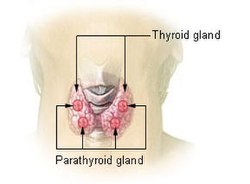Top Qs
Timeline
Chat
Perspective
Thyroiditis
Inflammation of the thyroid gland From Wikipedia, the free encyclopedia
Remove ads
Thyroiditis is the inflammation of the thyroid gland. The thyroid gland is located on the front of the neck below the laryngeal prominence, and makes hormones that control metabolism.
Thyroiditis is a group of disorders that all cause thyroidal inflammation. Symptoms, diagnosis and treatment depend on the cause of thyroiditis. Forms of thyroiditis are Hashimoto's thyroiditis, postpartum thyroiditis, subacute (de Quervain's) thyroiditis, silent thyroiditis, drug-induced thyroiditis, radiation-induced thyroiditis and acute thyroiditis.[1]
Remove ads
Types
Summarize
Perspective
Hashimoto's thyroiditis is an autoimmune disease where the body creates thyroid antibodies. It presents with hypothyroidism due to the destruction of thyroid cells.[2] In Hashimoto's thyroiditis, the hypothyroidism is most often permanent, with symptoms are fatigue, weight gain, depression, dry skin, and constipation.[1] Thyroid hormone replacement is the treatment of hypothyroidism.[3]
Silent thyroiditis or painless thyroiditis, also called subacute lymphocytic thyroiditis,[4] is a form of subacute thyroiditis with a self-limiting course of temporary hyperthyroidism followed by temporary hypothyroidism before return to normal thyroid function within months.[1][2] Elevated levels of thyroid hormones in the bloodstream, called hyperthyroidism, is in thyroiditis due to leakage of thyroid hormones from damaged thyroid cells into the bloodstream.[3] Symptoms of hyperthyroidism include weight loss, irritability, anxiety, insomnia, fast heart rate, and fatigue.[3]
Postpartum thyroiditis is when silent thyroiditis occurs within 6 months after delivery (postpartum).[2]
de Quervain's thyroiditis, also called subacute granulomatous thyroiditis, is a form of subacute thyroiditis presenting with a painful thyroid and a self-limiting course of temporary hyperthyroidism followed by temporary hypothyroidism before return to normal thyroid function within months.[1] It is possibly caused by a viral infection.[1]
Drug-induced thyroiditis may be caused by some drugs, such as lithium, amiodarone, interferon treatment, and immune check point inhibitors, and resolves after discontinuation of the drug.[3]
Radiation-induced thyroiditis occurs after treatment with radioactive iodine therapy or radiation therapy of the thyroid area and often results in permanent hypothyroidism.[1]
Acute thyroiditis, or suppurative thyroiditis, is a rare form of infectious thyroiditis most often caused by bacteria, which may cause severe illness.[1]
Riedel's thyroiditis, inflammation in which the thyroid tissue is replaced by fibrous tissue which can extend to neighbouring structures, is associated with IgG4-related systemic disease in which symptoms of autoimmune pancreatitis, retroperitoneal fibrosis and noninfectious aortitis also occur.[2]
Remove ads
Epidemiology
Most types of thyroiditis are three to five times more likely to be found in women than in men. The average age of onset is between thirty and fifty years of age.[3]
References
External links
Wikiwand - on
Seamless Wikipedia browsing. On steroids.
Remove ads

